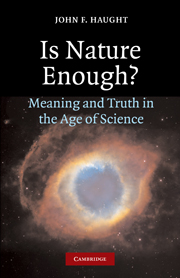10 - Suffering
Published online by Cambridge University Press: 05 June 2012
Summary
One of the main reasons why religion and theology are so appealing to their followers is that they provide answers to the problem of suffering. Today, however, the traditional answers do not always seem believable, and suffering, no less than death, seems to be just one more fact of nature. Especially after Darwin all aspects of life, including suffering, can apparently be understood in natural terms. To the strict naturalist this means that, as far as life's suffering is concerned, there is no need to fall back on obsolete religious interpretations, nor is there any good reason any longer for invoking the idea of a redeeming God. Humans, with the aid of science, can understand and respond to the fact of suffering all by themselves.
From Darwinian biology's point of view, suffering (which in this chapter I shall take to be inclusive of the sensation of pain by all sentient life) is simply an adaptation that enhances the probability of survival and reproductive success in complex organisms. How then could theology plausibly add anything of explanatory substance to the Darwinian naturalist's account? Darwin himself observed that suffering is “well adapted to make a creature guard against any great or sudden evil.” Suffering, he surmised, is life's warning system, and if at times the torture it brings seems exorbitant, the excess is still consistent with a purely naturalist understanding of life.
- Type
- Chapter
- Information
- Is Nature Enough?Meaning and Truth in the Age of Science, pp. 167 - 190Publisher: Cambridge University PressPrint publication year: 2006



